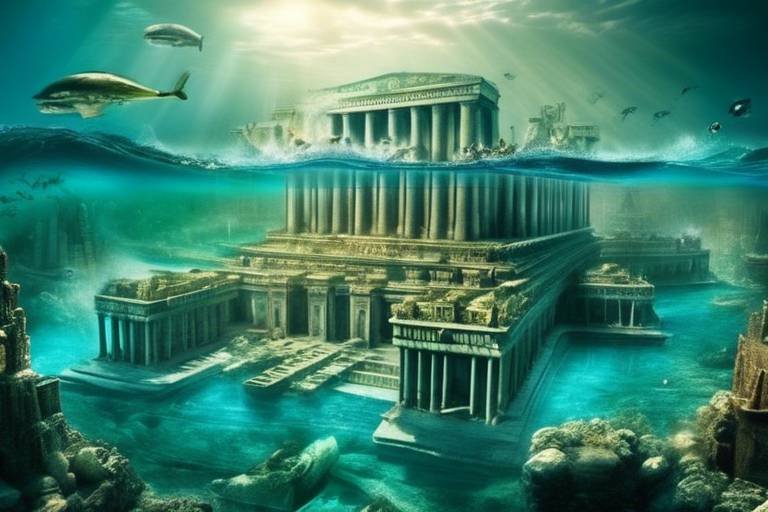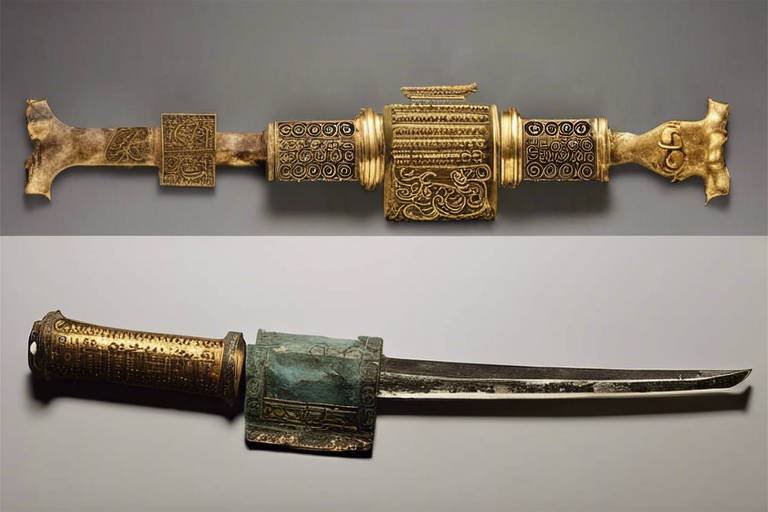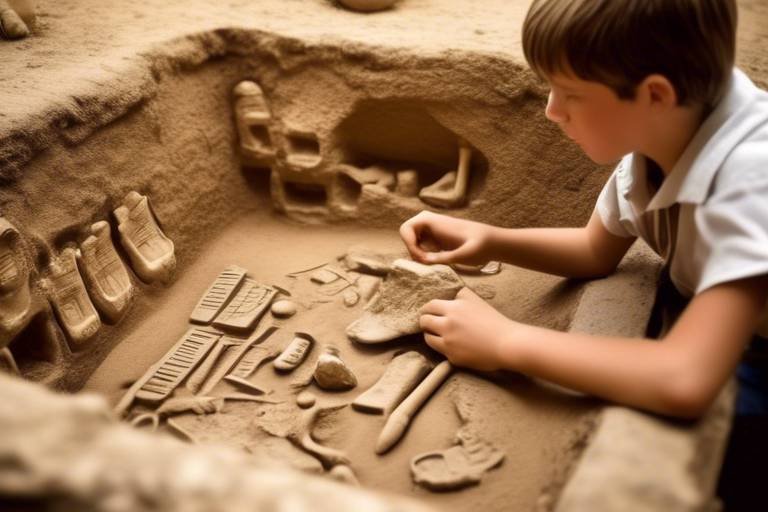The Truth Behind the Lost City of Atlantis
Have you ever pondered the enigmatic allure of the lost city of Atlantis? A legendary tale that has sparked curiosity and imagination for centuries, Atlantis remains a subject of fascination and debate among historians, archaeologists, and enthusiasts alike. But what lies beneath the mystique of this ancient civilization? Let's embark on a journey to uncover the truth behind the elusive city of Atlantis.

Historical Accounts
Historical accounts of Atlantis have been a subject of fascination and debate for centuries. The legendary lost city was first mentioned in the dialogues of the ancient Greek philosopher Plato, specifically in his works "Timaeus" and "Critias." According to Plato's writings, Atlantis was a powerful and advanced civilization that existed around 9,000 years before his time.
Plato described Atlantis as a wealthy island nation located beyond the "Pillars of Hercules," believed to be the modern-day Strait of Gibraltar. He detailed the city's layout, its sophisticated infrastructure, and its eventual downfall due to a failed attempt to conquer Athens. However, some scholars argue that Plato's account of Atlantis was meant to be allegorical rather than historical.
While Plato's descriptions provide the most well-known historical reference to Atlantis, other ancient texts and accounts also make mention of a lost civilization with similar characteristics. Some researchers have suggested that Atlantis could be connected to the Minoan civilization on the island of Crete, known for its advanced architecture and naval power.
Despite the lack of concrete archaeological evidence to support the existence of Atlantis as a physical place, the enduring legacy of Plato's writings has fueled numerous expeditions and investigations in search of the lost city. The debate between those who view Atlantis as a real historical location and those who see it as a philosophical allegory continues to intrigue historians and enthusiasts alike.

Geological Speculations
Geological Speculations surrounding the lost city of Atlantis have sparked a wide range of theories and hypotheses over the years. One of the most famous speculations is the idea that Atlantis was located in the Mediterranean Sea, near the island of Santorini. This theory is based on the volcanic eruption that occurred in the region around 1600 BC, leading some to believe that the destruction of Atlantis could be linked to this catastrophic event.
Another geological speculation suggests that Atlantis might have been situated in the Atlantic Ocean, as the name itself implies. Some researchers have pointed to underwater formations such as the Azores, a group of volcanic islands, as potential remnants of the lost city. The presence of submerged structures and unusual geological features in this area has fueled further speculation about Atlantis's possible location.
Moreover, the existence of a land bridge known as the "Pillars of Hercules" in ancient times has led to speculation that Atlantis could have been located beyond these boundaries, possibly in the Atlantic Ocean. This theory is supported by references in ancient texts that describe Atlantis as a powerful maritime civilization with advanced seafaring capabilities.
While these geological speculations provide intriguing insights into the possible whereabouts of Atlantis, the lack of concrete evidence continues to fuel debate among scholars and researchers. The search for Atlantis remains a fascinating journey that combines scientific inquiry with historical mystery, inviting us to explore the depths of our imagination and curiosity.

Modern Expeditions
Modern expeditions in search of the fabled lost city of Atlantis have taken researchers to the depths of the ocean and beyond. Cutting-edge technology, from deep-sea submersibles to satellite imaging, has been employed in the quest to uncover the truth behind this ancient mystery. These expeditions have faced numerous challenges, from treacherous underwater conditions to the vast expanse of the ocean floor.
One notable modern expedition that captured the public's imagination was led by a team of marine archaeologists who utilized sonar mapping to survey the seabed off the coast of Spain. Their findings reignited interest in the Atlantis legend, sparking debates among scholars and enthusiasts alike. The use of advanced scientific tools has allowed researchers to explore potential underwater structures that could be remnants of the lost city.
Despite these technological advancements, the search for Atlantis remains elusive, with many expeditions yielding inconclusive results. The vastness of the ocean and the passage of time present formidable obstacles to uncovering the truth behind this enigmatic civilization. However, each expedition brings new insights and discoveries, fueling the ongoing fascination with Atlantis and inspiring further exploration.

Cultural Impact
When it comes to the lost city of Atlantis, its cultural impact cannot be overstated. The myth and mystery surrounding this legendary civilization have inspired countless works of art, literature, and popular culture throughout history. From ancient Greece to modern times, Atlantis has captured the imagination of people around the world, leaving a lasting legacy that continues to influence our understanding of history and mythology.
One of the earliest and most famous references to Atlantis comes from the philosopher Plato, whose dialogues Timaeus and Critias describe the city as an advanced civilization that ultimately sank into the sea. This narrative has served as a source of inspiration for numerous writers, artists, and filmmakers, shaping the way Atlantis is portrayed in various forms of media.
Artistic representations of Atlantis often depict a utopian society with advanced technology and architectural marvels. The allure of a lost civilization with hidden knowledge and secrets has fueled the imaginations of creatives across different cultures and time periods, resulting in a rich tapestry of interpretations and adaptations.
Furthermore, the cultural impact of Atlantis extends beyond art and literature to influence scientific exploration and archaeological research. The quest to uncover the truth behind the myth has led to numerous expeditions and investigations, with researchers drawing inspiration from ancient texts and modern interpretations alike.
Whether viewed as a cautionary tale of hubris and destruction or a symbol of lost knowledge and wisdom, Atlantis continues to be a source of fascination and intrigue for scholars and enthusiasts alike. Its cultural significance lies not only in its mythical allure but also in the way it reflects our enduring fascination with the unknown and the possibilities that lie beyond the realms of conventional understanding.

Alternative Theories
Alternative theories surrounding the legendary lost city of Atlantis have sparked a wide range of speculations and imaginative ideas. While some researchers focus on traditional historical and archaeological interpretations, others delve into more unconventional and controversial hypotheses. One intriguing theory suggests that Atlantis was not a terrestrial civilization but rather an extraterrestrial outpost, with advanced beings visiting Earth in ancient times. This cosmic connection adds a sci-fi twist to the mystery of Atlantis, raising questions about the potential influence of alien visitors on human history.
Another alternative perspective proposes that Atlantis existed in a parallel dimension or timeline, leading to its disappearance from our reality. This time-travel theory suggests that the legendary city may have coexisted with ancient civilizations but in a different temporal plane, explaining why no physical evidence remains in our world today. Such ideas challenge conventional views of history and invite us to consider the possibility of parallel realities intersecting with our own.
Some theorists even speculate that Atlantis was not a physical place at all but a metaphorical symbol used in ancient texts to convey deeper philosophical or spiritual concepts. According to this interpretation, the story of Atlantis represents a cautionary tale about hubris, the consequences of human arrogance, or the cyclical nature of civilizations rising and falling. Viewing Atlantis as a metaphor opens up discussions about the symbolic meanings embedded in myths and legends throughout history.

Archaeological Discoveries
Archaeological discoveries related to Atlantis have sparked both excitement and controversy in the field of ancient history. While some researchers claim to have found evidence supporting the existence of this mythical city, others remain skeptical about the validity of such claims. One of the most famous archaeological sites linked to Atlantis is the Minoan civilization on the island of Crete. The advanced nature of the Minoan culture, as evidenced by their sophisticated architecture and artwork, has led some to speculate that they could be connected to the lost city.
Furthermore, underwater expeditions have uncovered intriguing structures and artifacts in locations like the Caribbean and the Mediterranean Sea, fueling speculation about their potential ties to Atlantis. These discoveries, ranging from submerged ruins to ancient pottery, have raised questions about the extent of human civilization's reach in antiquity and the possibility of a lost advanced society.
However, the lack of concrete evidence directly linking these findings to Atlantis has left many questions unanswered. The interpretation of archaeological data is often subjective, leading to differing opinions among experts regarding the significance of these discoveries. Without definitive proof, the debate over the existence of Atlantis based on archaeological evidence remains unresolved.

Lost City or Metaphor?
When it comes to the mystery of Atlantis, one of the most intriguing debates revolves around whether it should be viewed as a literal lost city or a symbolic metaphor in ancient texts. The enigmatic nature of Atlantis has sparked diverse interpretations and scholarly discussions over the years, fueling speculation and curiosity about its true essence.
For some, Atlantis is seen as a tangible civilization that met a catastrophic end, possibly submerged beneath the waves of the ocean. Proponents of this view point to various historical accounts and geological speculations as potential evidence supporting the existence of a physical Atlantis. They argue that the detailed descriptions provided by ancient sources like Plato suggest a real, albeit lost, city waiting to be rediscovered.
On the other hand, there are those who interpret Atlantis as a metaphorical construct, representing ideals, moral lessons, or even political allegories in ancient narratives. According to this perspective, Atlantis serves as a symbolic reflection of human hubris, the perils of arrogance, or the consequences of societal decay. In this light, the story of Atlantis transcends mere geography to convey deeper philosophical or moral messages.
As the debate continues among historians, archaeologists, and mythologists, the question of whether Atlantis is a lost city or a metaphor remains open to interpretation. Each new discovery, theory, or interpretation adds another layer of complexity to this enduring mystery, inviting further exploration and contemplation into the enigmatic legacy of Atlantis.

Legacy of Atlantis
As we delve into the , it becomes clear that this mythical city has left an indelible mark on human imagination and culture. The enduring fascination with Atlantis extends far beyond ancient texts and historical debates, shaping our understanding of history and mythology in profound ways.
Throughout the centuries, Atlantis has inspired countless works of art, literature, and popular culture. From Renaissance paintings to modern-day movies and novels, the allure of this lost city continues to captivate audiences around the world. Its mysterious disappearance and utopian reputation have provided fertile ground for creative minds to explore themes of hubris, destruction, and the quest for knowledge.
Moreover, the legacy of Atlantis transcends mere entertainment, influencing philosophical and scientific discourses as well. The quest for Atlantis mirrors humanity's eternal search for meaning and truth, prompting us to ponder the mysteries of the past and the possibilities of the future. It serves as a reminder of the impermanence of civilizations and the enduring allure of the unknown.
Some scholars argue that Atlantis should be viewed not as a literal place but as a metaphor for the fragility of human achievement and the consequences of unchecked ambition. In this interpretation, the story of Atlantis serves as a cautionary tale, warning against the dangers of overreach and the hubris of power. It prompts us to reflect on our own society's values and priorities, urging us to learn from the mistakes of the past.
Ultimately, the legacy of Atlantis endures not because of any concrete evidence or historical proof but because of the enduring power of myth and storytelling. It represents a timeless enigma that continues to spark curiosity and debate, inviting us to ponder the boundaries between reality and imagination, history and legend.
Frequently Asked Questions
- Is Atlantis a real place?
While the existence of Atlantis remains a subject of debate and speculation, there is no concrete evidence to support its existence as a physical location. The story of Atlantis is primarily found in the dialogues of Plato, leading many to interpret it as a philosophical allegory rather than a literal city.
- What are some popular theories about the location of Atlantis?
Several theories have been proposed regarding the possible location of Atlantis, including the Mediterranean Sea, the Atlantic Ocean, and even Antarctica. However, due to the lack of empirical evidence, these theories remain speculative and have not been conclusively proven.
- Have any archaeological discoveries definitively linked to Atlantis been made?
While there have been various archaeological findings that some believe could be connected to Atlantis, such as the ruins of ancient civilizations like Minoan Crete or Thera, none have provided irrefutable evidence of the existence of the lost city. The search for Atlantis continues to intrigue researchers and explorers around the world.
- What is the significance of the Atlantis legend in popular culture?
The legend of Atlantis has inspired countless works of art, literature, and film, becoming a symbol of a utopian society lost to the depths of the sea. Its enduring appeal lies in its mystery and the allure of a civilization with advanced knowledge and technology. The legacy of Atlantis continues to captivate the imagination of people across the globe.



















